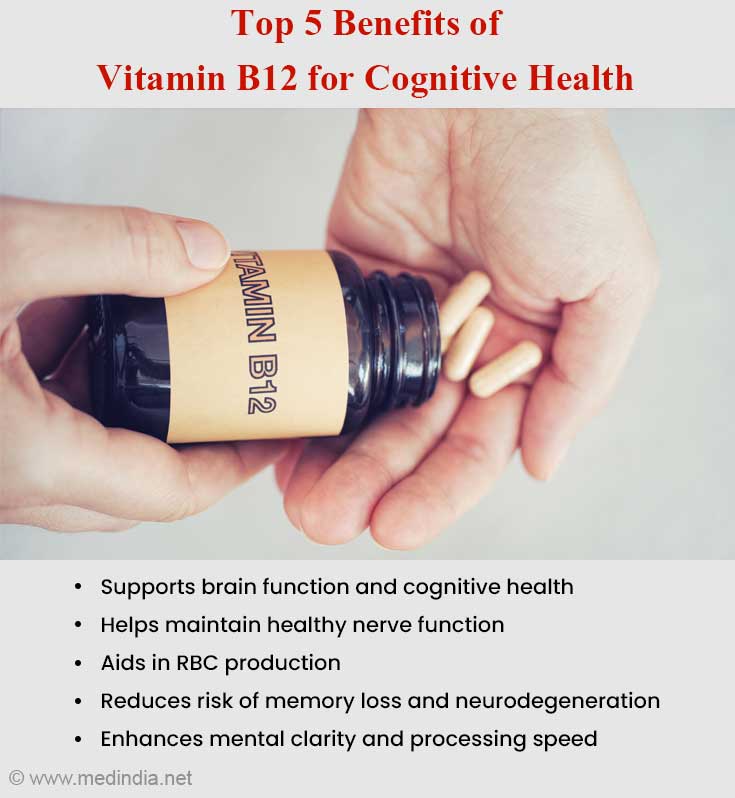Low and high vitamin B12 levels may affect cognitive function, slowing brain processing and increasing neuro-degeneration risks in older adults.
- Low vitamin B12 levels slow brain signal transmission and processing speed
- High B12 levels may increase biomarkers linked to neuro-degeneration
- Active B12 measurement may be more accurate than total B12 levels
Vitamin B12 Levels Association with Functional and Structural Biomarkers of Central Nervous System Injury in Older Adults
Go to source).
Both low and high vitamin B12 levels can impact brain function, even if they are within the normal range! #brainhealth #medindia’
Prevalence of Vitamin B12 Deficiency
Although vitamin B12 deficiency is considered rare, low or marginal levels are relatively common, affecting up to 40% of populations in Western countries. Despite this, recommendations for daily intake remain consistent, with health organizations suggesting 2.4 micrograms per day for individuals over the age of 14.Cognitive Effects of Lower Vitamin B12 Levels
Research suggests that lower levels of vitamin B12, even within the normal range, may contribute to cognitive decline in older adults. One of the key findings is that individuals with lower B12 levels show a delay in signal transmission within the brain. This is believed to be linked to the role of B12 in maintaining the insulation of nerve cells, also known as myelin.Additionally, individuals with lower B12 levels tend to experience slower processing speeds and an increase in brain changes associated with cognitive impairment. These effects may be more pronounced with aging, emphasizing the importance of maintaining adequate B12 levels throughout life.
Cognitive Risks Associated with Higher B12 Levels
While much focus has been placed on the dangers of B12 deficiency, higher levels of the vitamin may also present cognitive concerns. Elevated B12 levels have been linked to increased markers of neuro-degeneration, particularly higher levels of T-Tau protein, which is associated with dementia.One explanation for this phenomenon could be an imbalance between active and inactive forms of B12 in the blood. A high level of inactive B12 with a low level of active B12 may indicate an underlying issue with how the body processes the vitamin. However, further research is required to determine the exact implications of this relationship.
Potential Need for Revised B12 Guidelines
Given the findings that both lower and higher levels of B12 may impact cognitive function, there is a growing discussion on whether recommendations for B12 intake should be revised, particularly for older adults. Current guidelines are based on population averages rather than specific neurological or cognitive health markers. A more comprehensive approach, including measurements of active B12 and cognitive function, may be necessary to establish optimal levels for brain health.
Ensuring Adequate B12 Intake
To maintain healthy B12 levels, individuals should consume foods rich in the vitamin, such as fish, beef, eggs, dairy, and fortified cereals. Those following vegetarian or vegan diets may need to rely on supplements to ensure they meet daily requirements.
Vitamin B12 is essential for brain and nerve function, and both lower and higher levels within the normal range may be associated with cognitive issues in older adults. Lower levels have been linked to slower brain signal transmission and cognitive decline, while higher levels have been associated with neuro-degeneration markers. Measuring active B12, rather than just total levels, may be a more accurate way to assess B12 status. Ensuring adequate intake through diet and supplementation, particularly in at-risk populations, may help support long-term cognitive health.
Reference:
- Vitamin B12 Levels Association with Functional and Structural Biomarkers of Central Nervous System Injury in Older Adults - (https://onlinelibrary.wiley.com/doi/10.1002/ana.27200)
Source-Medindia















